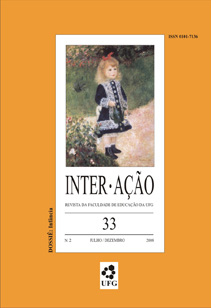The identification mechanism: an analysis based on Freudian theory and the critical theory of society
DOI:
https://doi.org/10.5216/ia.v33i2.5275Abstract
This study is a reflection on the identification mechanism and for its basis uses Freud’s social texts and the contributions of the Critical Theory of Society. The invocation of this concept shows that it has been emptied of its content and human significance in such a way that considerations on the theme indicate this to be the way to get orientation as to how to understand the other side of indifference and indifferentiation, in an attempt to salvage the human meaning of social relations. Individuals, instead of identifying between themselves, are identifying themselves with an irrational social totality. Consequently, culture and society of which individuals are a part, have been using compulsive strategies to create identification links between their members, given the decline of the spontaneous formation of these links in current society.Downloads
Downloads
Published
How to Cite
Issue
Section
License
Inter-Ação uses the Creative Commons Attribution 4.0 License for Open Access Journals (Open Archives Initiative - OAI) as the basis for the transfer of rights. Open access means making documents available on the Internet free of charge, so that users can read, download, copy, distribute, print, search, or link to the full text of documents, process them for indexing, use them as input data for software programs, or use them for any other lawful purpose, without financial, legal, or technical barriers.
Authors publishing in this journal agree to the following conditions:
1) Authors retain copyright and grant the journal the right of first publication, with the work simultaneously licensed under the Creative Commons Attribution License, which permits redistribution of the work with attribution and first publication in this journal.
2) Authors are permitted to enter into additional, separate agreements for non-exclusive distribution of the version of the work published in this journal (e.g., for publication in an institutional repository or as a book chapter), with attribution and first publication in this journal.
3) Authors are permitted and encouraged to publish and distribute their work online (e.g. in institutional repositories or on their home page) at any time before or during the editorial process, as this may generate productive changes as well as increase the impact and citation of the published work.















